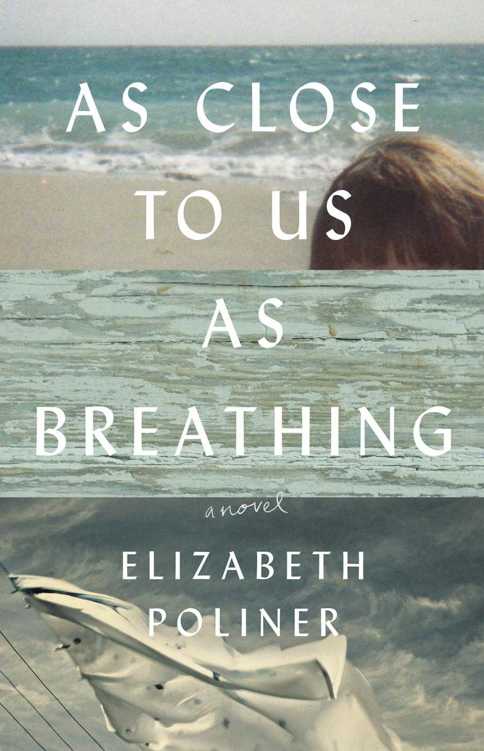
As Close to Us as Breathing
A Novel
کتاب های مرتبط
- اطلاعات
- نقد و بررسی
- دیدگاه کاربران
نقد و بررسی

January 25, 2016
Poliner’s (Mutual Life & Casualty) novel is an exquisitely written investigation of grief and atonement, and an elegy for a Jewish family bound together by tradition and tribe. The three Syrkin sisters, Ada, Vivie, and Bec, and their children spend their summers—joined by their husbands on the weekend—at the family cottage in the Jewish section of Woodmont, Conn., known as Bagel Beach. In the summer of 1948, though, “our worlds collapsed... we made sure they did,” after the accidental death of Ada and Mort’s youngest, Davy. The prices paid for redemption, necessary or not, are highest for Bec, the only unmarried Syrkin sister, and Ada and Mort’s oldest son, Howard. Also affected is Davy’s sister and the book’s narrator, Molly, 12 at the time. Tradition and “doing right” run through the novel, extending back a generation and tying together Mort’s bachelor brother Nelson, Bec, and Howard in a wonderfully sad synchronicity. That Molly reveals so little of herself while stories unfold all around her is a marvelous device Poliner uses to impel the reader forward. Agent: Duvall Osteen, the Aragi Agency.

Starred review from December 15, 2015
Poliner's follow-up to Mutual Life & Casualty (2005) limns a Jewish family too close-knit for its individual members' good. "The summer of 1948 my brother Davy was killed in an accident," Molly tells us in her first sentence. Twelve years old at the time, she looks back from the vantage point of 1999 to consider the fraught family dynamic that contributed to the accident. The Syrkin sisters--Vivie, Bec, and Molly's mother, Ada--summer every year with their families on "Bagel Beach," one of the few portions of the Connecticut shore open to Jews. Their distrust of outsiders is understandable, with the Holocaust a recent memory, but as Molly's narration delves into dramas from before and after Davy's death, we see that the family's collective needs too often take precedence over personal happiness--especially if it involves moving beyond their tight little community's boundaries. Molly's uncle Nelson lost the love of his life when he dutifully went to work in the family department store instead of pursuing the academic career he wanted. Her brother Howard, in love with an Irish Catholic girl, rejects her after Davy's death, seeing it as punishment for being "self-indulgent." Molly's cousin Nina also takes away from the accident a deep sense of guilt and unworthiness to be loved that scars her life. Warm scenes of Shabbos dinners and summer leisure evoke the appeal of this sheltering world, but an ugly quarrel between Molly's parents makes clear that it's governed by strict rules, and those who violate them will be punished. Selfish, fun-loving, ultimately devastated Ada is perhaps the most emotionally tangled family member, but Poliner depicts each character with sensitivity and insight. Molly's coming-of-age is the delicate connective tissue that binds together the novel's chronologically fragmented episodes, revealing them as pieces in a mosaic of enlarged understanding--the narrator's and ours. Beautifully written, stringently unsentimental, and yet tender in its empathy for the perennial human conflict between service and self.
COPYRIGHT(2015) Kirkus Reviews, ALL RIGHTS RESERVED.

January 1, 2016
Tragedies define lives, and Poliner (Mutual Life & Casualty) demonstrates how a tragic accident shatters the extended Syrkin and Liebritsky families during an idyllic summer at a Connecticut beach. From the outset, the reader knows that Davy, the youngest child, will die in an accident; however, it is only in the last few pages that the fatal incident occurs. In between, the author explores the backstories of the Syrkin sisters, Liebritsky brothers, and their children; she moves forward in time to relate the fates of all the family members in the decades after the loss of Davy and reveals the secrets each individual is keeping. Poliner's empathy for her characters pulls the reader into this saga of a Jewish family in the mid-20th century. Each family member is struggling to live up to the expectations of their parents. Everyone is looking for love, despite the knowledge that its ideal form is not to be found. VERDICT This elegant novel is for readers who enjoy the depiction of complicated family dynamics and those who believe that people will be able to overcome tragic events. [See Prepub Alert, 9/28/15.]--Andrea Kempf, formerly with Johnson Cty. Community Coll. Lib., Overland Park, KS
Copyright 2016 Library Journal, LLC Used with permission.

February 1, 2016
In 1948, Molly Leibritsky is spending the summer as she always does, at the family beach house with her mother, aunts, siblings, and cousins. It is a time of great freedom for them all. On the weekdays, the children busy themselves with ice cream, sailing, and exploration, while the sisters reminisce about their own childhood days there. Only on the weekends, when the husbands arrive for the Friday night Sabbath meal, do they all have to button up and buckle down. But when Molly's younger brother is killed in an accident, the carefree days come to an end. The family is paralyzed by blame and guilt. As the years go by, each member of the family faces his own measure of grief and regret, and none is left untouched by the far-reaching heartbreak of such a devastating loss. Poliner alternates between narrators and eras, sometimes rather abruptly, to weave a story of many generations of sacrifice, tradition, and hope. The resulting saga highlights the complexity of family relationships and the many emotions of great loss.(Reprinted with permission of Booklist, copyright 2016, American Library Association.)

























دیدگاه کاربران